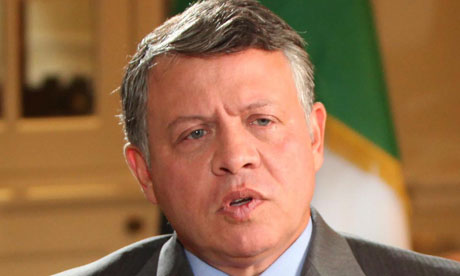While protests have been muted, opposition is growing – and is
more nuanced than the monarchy or its western backers realise.
By Julien Barnes-Dacey

Since King Abdullah's initial enthusiasm for reform, 'movement has slowed, and talk of a meaningful parliamentary democracy all but disappeared'. Photograph: EPA
Jordan's
government has proposed a new election law that has dealt a further blow to
those hoping for meaningful reform in the Hashemite kingdom. The law, which
severely limits the number of seats that opposition parties can hold in
parliament, was this week supplemented by a proposed ban on political parties
established on a religious basis.
Both
moves represent a direct assault on the Islamic Action Front (IAF), the
political arm of the Muslim Brotherhood and the country's leading political
party, which would be likely to gain power in any free and fair election.
Coming on the back of the recent detention of 13 youth activists (since
pardoned) on charges of insulting the king, the measures have highlighted the
kingdom's dwindling reform ambitions.
When
unrest first hit north Africa, King Abdullah was one of the first Arab rulers
to pre-emptively embrace the mantra of reform, establishing an independent
election body and a constitutional court. He also hinted at a willingness to
empower the long-neutered parliament and weaken his own powers, which give him
the right to appoint and dismiss governments.
Since
this initial burst, however, movement has slowed, and talk of a meaningful
parliamentary democracy has all but disappeared. While the Jordanian parliament
is the author of the new restrictive measures, there are few who doubt the
king's controlling hand over the wider political process. With violent
instability growing on its northern border and more than 95,000 Syrians already
seeking refuge in the country, the brakes are likely to be applied more firmly
than ever.
Despite
the slow pace of reform, the west continues to embrace the king's
self-proclaimed reforming instincts, largely due to his continuing willingness
to assist in the fight against extremism. Europe recently offered Jordan
enhanced financial and trade assistance, despite the fact that Freedom House
rates the country as "not free" compared to "partly free"
when Abdullah first came to power in 1999.
However,
as regional plates shift, the king and his western backers may be misjudging
the challenges ahead. While Abdullah maintains popular legitimacy and faces no
immediate threat of revolutionary upheaval, tremors of unrest are growing.
Pointedly, the introduction of hollow legislation disguised as reform,
restrictions on the IAF and the detention of protesters are precisely steps
that will antagonise the environment, potentially serving to spark new
tensions.
While
incomparable to the protests that have swept north Africa and Syria,
demonstrations have been happening across Jordan for more than a year now.
Though often small in number – ranging from a few hundred to more than 10,000 –
the discontent represents an unprecedented challenge to the status quo. For the
most part the regime has refrained from forcefully pushing back against
protesters but periodic clashes threaten to break the calm.
Moreover,
the emerging opposition is multi-faceted, presenting the king with a more
complex challenge than he has ever faced. Although driven by economic
discontent, with unemployment potentially as high as 30%, it is increasingly
political.
On
the one side the traditional opposition – represented by the Muslim
Brotherhood's political arm – is demanding greater power, notably the right of
parliamentary majorities to appoint empowered governments in place of the king.
But
the opposition also includes elements from within the regime's traditional
support base, indigenous East Bank tribes, who are bitter about their dwindling
share of the state pie in the face of a decade of privatisations and cuts in
public spending, and see reform as the best way of asserting their rights.
Taken
together, and though disunited in their goals (East Bankers fear extensive
liberalisation will challenge their interests), the two groups represent a
powerful force. With the country also broke and heavily dependent on foreign
aid, the king has little wiggle room.
For
the moment the opposition calls for reform rather than regime change, but the
signs are becoming clear that Abdullah has failed to understand the new
pressures unleashed by the Arab awakening. Following the recent measures the
IAF is now threatening to boycott upcoming elections – a move that would
further delegitimise the political system, threatening new uncertainties.
At
a time of growing regional instability, the king, encouraged by his western
backers who offer such important economic and political support, should be
making meaningful engagement on the reform question a much greater priority
than suggested by recent steps.
-This commentary was published in The Guardian on 19/04/2012
- Julien Barnes-Dacey is a senior Middle East policy fellow at the European Council on Foreign Relations
- Julien Barnes-Dacey is a senior Middle East policy fellow at the European Council on Foreign Relations
No comments:
Post a Comment